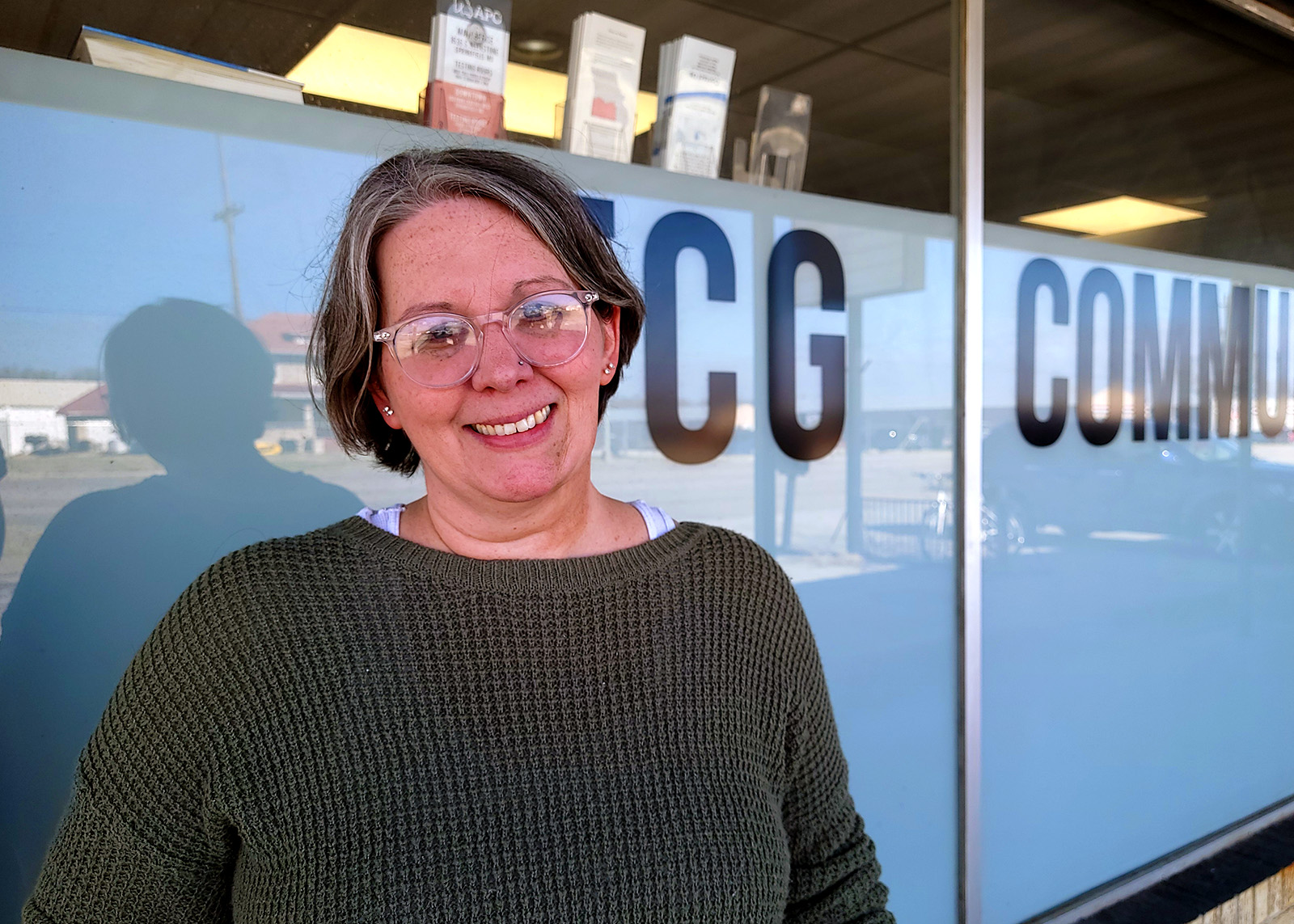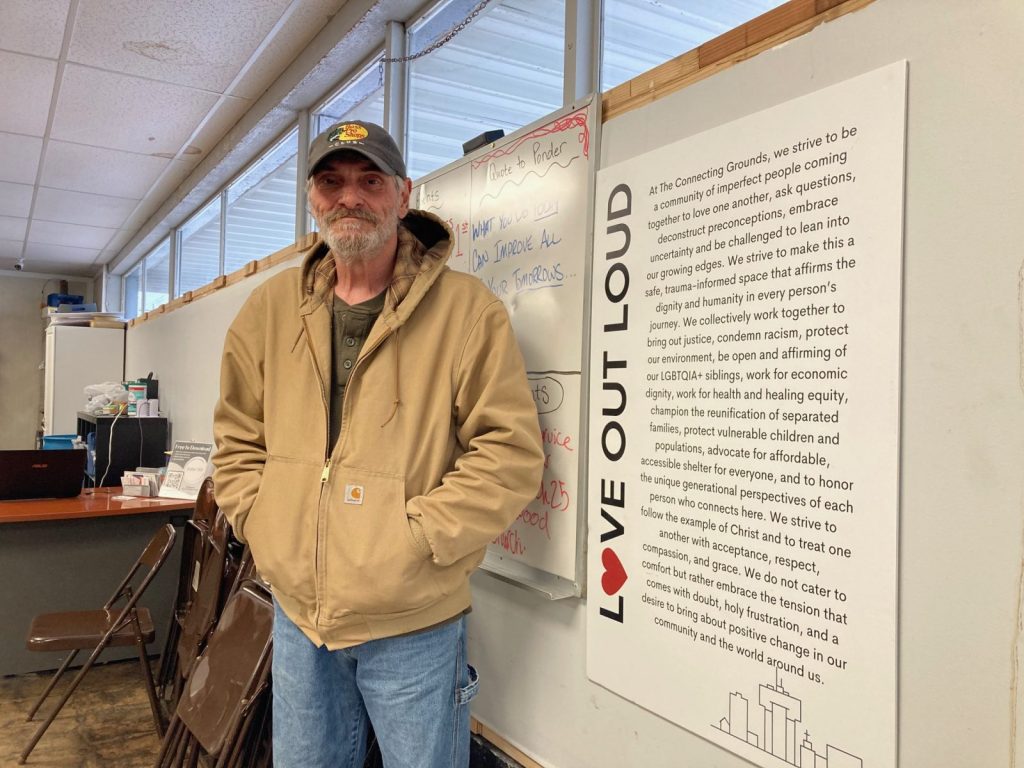The Connecting Grounds Church has been operating as a crisis cold weather shelter this winter thanks to a special use permit.
That permit expires at the end of April, but Pastor Christie Love is requesting city officials allow her to continue using the church building at 4341 W. Chestnut Expressway as a transitional shelter year round.
Love, along with the Rev. Phil Snider from Brentwood Christian Church, made a Facebook live video Sunday night to share the plans with their congregations.
“We have numerous churches around Springfield that open up their doors when the temperature is 32 degrees or below,” Love said. “But we know that the need exists all year round. We know that we need shelters every single night of the year, not just when it’s cold, not just when it’s hot. But even on the nights that it’s nice.
“We know that stability increases all kinds of components for people,” she continued in the video. “It improves quality of life. It improves physical health. It improves sobriety and improves just all of the different pieces across the board. And Springfield is in desperate need of more shelter space.”
The special use permit allows the church building to provide shelter for up to 15 individuals.

If Love’s request is approved and the building continues to be used as a shelter, the Connecting Grounds congregation will begin having in-person services on Saturday nights in the fellowship hall at Brentwood Christian Church in southeast Springfield. Those Saturday night services begin this weekend.
Snider, with Brentwood Christian Church, said the idea of sharing his church building with Love’s congregation came to him during a conversation with Love.
“We’ve had a chance to collaborate a lot with the Connecting Grounds over the years,” Snider said. “Pastor Christie was talking about the need to have space and it just occurred to me: Ya know, I know about a church. I know about a church that on Saturday nights has a completely open fellowship hall that has lots of space.
“I was really excited to take this to the leadership team at Brentwood, and they enthusiastically wanted to support the work of the Connecting Grounds continuing shelter,” Snider said. “I am super grateful to be a part of this.”
Both Love and Snider said they hope other faith communities view the Connecting Grounds and Brentwood Christian Church partnership as a model.
“With all of the empty buildings, church buildings around Springfield on a regular basis, there’s so much possibility for collaboration,” Snider said. “Springfield is full of churches and for us to have a chance to really utilize our spaces in the spirit of Jesus.
“It’s the kind of work Jesus was about,” Snider said, referring to Connecting Grounds’ focus on helping the unsheltered. “It’s the kind of work of just hands-on responses to the gospel, of not just talking about the gospel in terms of ideas to consider and to accept into your heart — but a real life way of living out the gospel in the spirit of Jesus. And I’m inspired by that, and here at Brentwood, we’re just honored to be a part of it.”
Fire Dept. and BDS must approve plans
Brendan Griesemer is assistant director of Planning and Development for the City of Springfield. Griesemer said he is not personally familiar with the Connecting Grounds request, but noted the Springfield Fire Department and Building and Development Services would have to inspect the building for “life safety issues.”
Love said she is ready to make any upgrades to the building, including adding a sprinkler system so that it passes all inspections.
Love said in an earlier interview that she submitted her request to Jason Gage, city manager, and that she is working with him to get any necessary inspections done.
Love pointed out this would not be the first time a church is allowed to be a year-round shelter. The Council of Churches of the Ozarks has partnered with Pathways United Methodist Church for many years for the Safe to Sleep overnight shelter for women. For this shelter program, the women sleep on cots in the church’s gymnasium. The women leave during the day and must bring all of their belongings with them.
“There is a precedent. We are not in completely uncharted territory, because Safe to Sleep has already kind of navigated that a little bit for us,” Love said in an earlier interview. “We've got established guidelines for cold weather shelter. ... I think this is an important public policy question for us to be talking about. If you've got willing buildings and churches that are willing to go through those steps like they do in the winter, why can we not do that in spring and summer and the fall?”
Who could stay at the shelter?
Love is wanting to create a transitional shelter model in her church building that would allow people to leave their belongings during the day. The shelter will be open to them 5 p.m. to 8 a.m.
The people currently staying at the shelter are participants in the Connecting Grounds volunteer program. To stay at the shelter, they must give 15 hours of service a week at the Outreach Center.
Unsheltered people who help out at the Outreach Center earn $10 an hour, but that isn’t paid in cash. Instead, the payments go to anything that helps the person move toward stability (paying fines, old utility bills, settling old evictions, tuition at Ozarks Technical Community College, etc.)
For those staying at the shelter, 10 of those 15 required hours at the Outreach Center will go toward their room and board.
The shelter program will require sobriety, and random urine and breath tests will be given. Visitors are not allowed. Pets are not allowed unless it is a certified service or support animal.
Case management will be offered and residents must be working on personal goals that will lead to stability and housing.
“These would be the same individuals that would be staying every single evening until they are able to transition into a stable shelter situation for themselves,” Love said. “It would not necessarily be like what we see with crisis, cold weather shelter where, you know, anybody can just show up until our beds are full. This would be individuals that are currently engaged in our volunteer program.”
Shelter resident hopes plans are approved
Mike Garris is among those currently staying at the Connecting Grounds shelter and participating in the volunteer program.
He spoke with the Hauxeda Tuesday afternoon as he was wrapping up his shift as leader of the clean-up crew.
Garris said he used to have a great job installing self-checkout machines in Walmart stores. But when the pandemic hit, the company he worked for cut everyone who didn’t have an IT degree — including Garris.

He said he went from earning good money to “zero overnight and basically ended up losing everything.”
“I was staying in a tent until two years ago,” he said. “I went to a sober living program and was in it for nine months.”
Garris said he got into housing briefly but “one thing led to another and I ended up back out here.”
The 59-year-old Bolivar native has called Springfield home for the past 30 years. He began volunteering at the Connecting Grounds Outreach Center a few years ago when it was located on Commercial Street. When he found himself without shelter again last fall, he returned to the Connecting Grounds Church and Outreach Center, both of which have since moved to locations on Chestnut Expressway.
Garris said having a safe and stable place to sleep, eat and shower every day is “really nice” and allows him to work part time and also volunteer at the Outreach Center three days a week.
If the city allows the church building to be used as a transitional shelter year round, Garris said he hopes to find a full-time warehouse job, continue to save some money and get his own place.
If the shelter closes at the end of April, he’s not sure what will happen.
“If you don’t have a place where you can sleep every night, a place that you can take a shower every night — you know what I mean?” he said, shaking his head. “It’s hard, first of all, to go to job interviews and get hired somewhere when you don’t really have an address to give them. Nobody wants to hire somebody that doesn’t have a place to live.
“(Love) and the Connecting Grounds, they’ve helped me so much over the years. I am so grateful to her. She’s like the biggest homeless advocate in town,” Garris said. “She’s out here moving mountains trying to help all kinds of people.”
Connecting Grounds moves services to Brentwood Christian Church
The Connecting Grounds congregation has been having virtual services since last fall when they first converted the church building into a cold weather shelter.
The congregation will return to in-person services this Saturday evening at Brentwood Christian Church, 1900 E. Barataria St.
Dinner will be served at 5 p.m. Service will follow.
Communion this Saturday will be a taco bar, Love said on the Facebook live announcement.
For those needing transportation to Brentwood, be at the Outreach Center at 3000 W. Chestnut Expressway by 4 p.m. Saturday.

